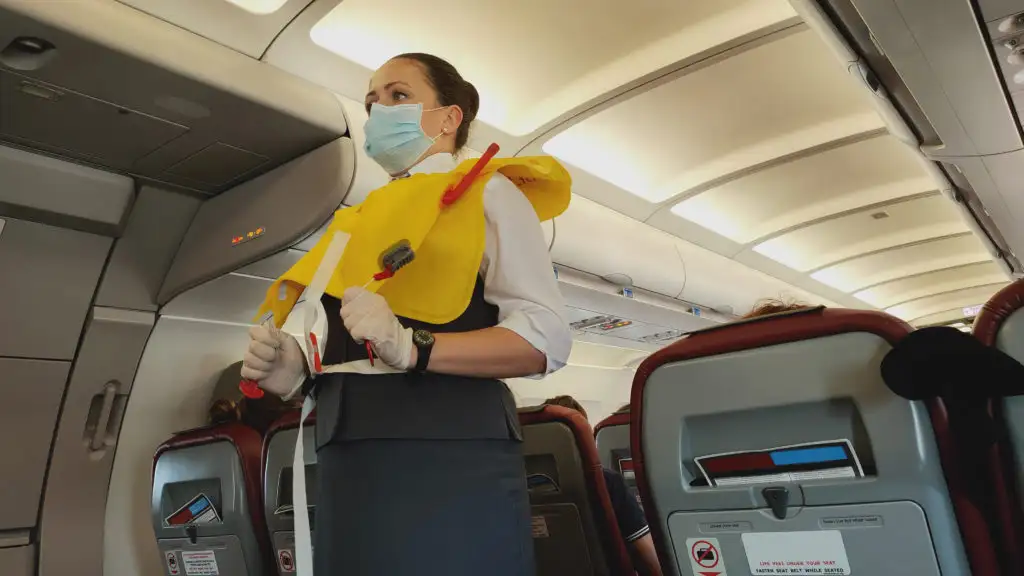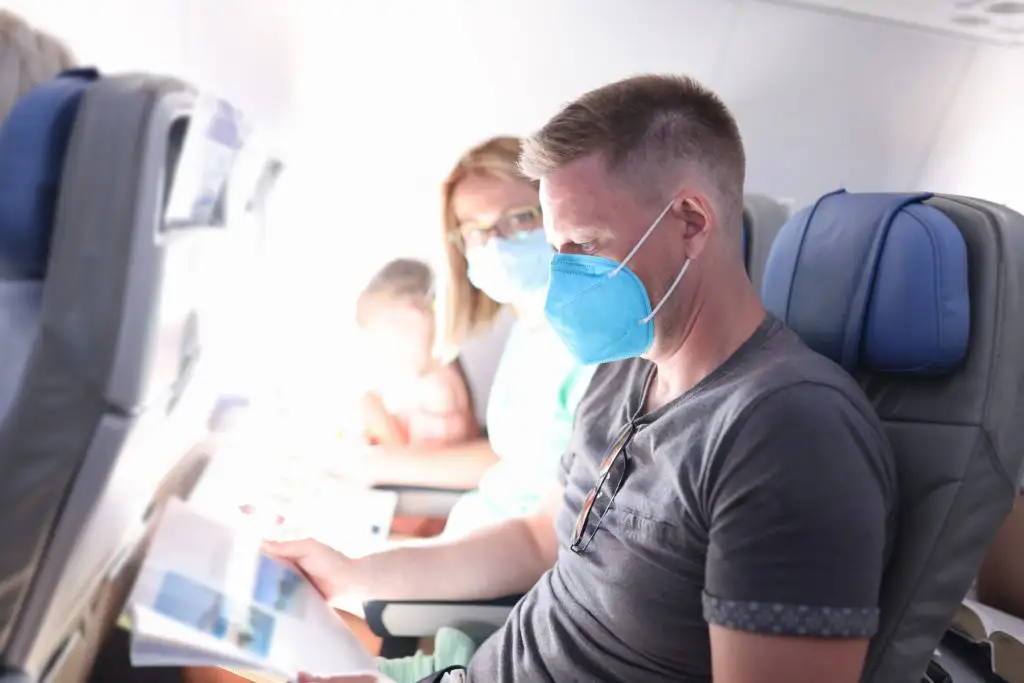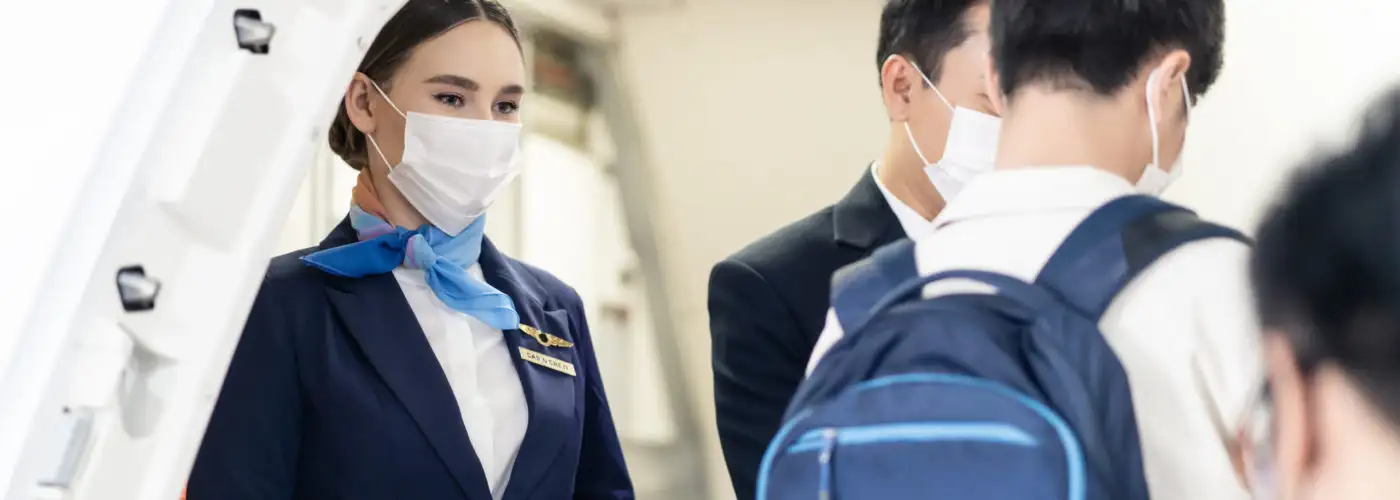On the first day of any airline’s flight attendant training program, the in-flight instructors tell the new hires that their job, should they pass the course, is 95 percent safety and 5 percent service. However, flight attendants routinely say to one another that most passengers don’t notice them until something goes wrong. During the live safety demonstration, the crew is standing front and center, but as they scan the cabin they usually find passengers gazing out the window, sleeping, texting, anything but watching the vital information they’re providing. Nonetheless, when something seems amiss and a situation arises onboard, you bet all eyes (and cellphone cameras) are on them.
At the start of the pandemic, airlines were quick to cut back on in-flight service offerings as a safety precaution for both passengers and crew. Before the vaccine was readily available it made sense to make air travel as contactless as possible since airline crews travel to and from different cities and states multiple times a day, stay at different hotels, and then come in contact with their passengers. The scenario could have created a possible perfect storm for further spreading COVID-19. Thankfully the service reduction, coupled with the sanitizing efforts the industry put in place, and the air filtration system onboard made the aircraft cabin one of the safest places to be. According to The Association of Flight Attendants, in 2020 only a little over 1,000 flight attendants across the industry contracted COVID-19, which is less than 1 percent of flight attendants employed at U.S. airlines in 2019.
Masks play the largest role in keeping the aircraft cabin safe from spreading the virus, but it seems to be a catalyst for creating unsafe situations.

Unlike the in-flight service changes, mask policies rolled out much more slowly. JetBlue became the first airline to announce a mask requirement on April 28, 2020, then other airlines followed, (but on their own timeline since a federal mandate didn’t come until January 2021). For a while, you could fly maskless on one airline and be required to wear one on another. It added another duty to the role of cabin crew: mask police.
The Federal Aviation Administration (FAA) requires each flight attendant to carry a manual while working, which contains company policy and procedures for everything from seatbelts to in-flight service and evacuations. Flight attendants must learn, follow, comply with and enforce everything in the manual. They can face disciplinary action including termination if they don’t, and because the contents are submitted to and approved by the FAA, they can be tested on the contents at any time by an unannounced FAA inspector. Imagine knowing your job, livelihood and the safety of everyone around you could depend on someone else’s willingness to follow the rules. But unlike a police officer, you cannot issue a summons or any immediate repercussion to someone who chooses not to comply.
Cabin crew are trained to “inform and ask,” inform the passenger of the regulation and then ask them to comply. In the most extreme situations on the ground, flight attendants can request for a passenger to be removed from the plane for noncompliance, but once airborne, it’s up to them to handle the situation until the aircraft is safely on the ground. The President of the Association of Flight Attendants, Sara Nelson, told me “flight attendants are charged with the safety, health, and security of everyone in the cabin. Our instructions to the traveling public keep everyone safe…Listen up and do your part.”
But not everyone is listening and because of that, on January 13, 2021, FAA Administrator Steve Dickson signed an order directing a stricter legal enforcement policy against unruly airline passengers, including those who refuse to wear a mask, which finally gave cabin crew a level of support and reinforcement from the agency. But one flight attendant based in Chicago said, “I think this summer is going to be brutal. Not only will the mask have to be worn but with hot airplanes, it’s going to be a nightmare to enforce.”

It already is. Since January 2021, the FAA has received 3,000 reports of unruly behavior by passengers, including about 2,300 reports of passengers refusing to comply with the federal mask mandate. On June 14th they revealed the latest four passengers to receive fines under the stricter ranging from $7,500 to $15,500.
Not all of the reported incidents are facemask-related, and alcohol often plays a role. On board a Southwest Airlines flight at the end of May from Sacramento to San Diego a passenger verbally and physically assaulted a flight attendant, when asked to raise their seat and tray table.
In response to that incident and the others, Southwest removed alcohol from all flights until the end of July, United only offers it on domestic flights over 800 miles and American Airlines removed theirs until September 13 when the federal mask mandate is set to expire, saying in a memo to crews “that alcohol can contribute to atypical behavior from customers onboard.” (A sentiment that flight attendants have been expressing for years.)
Of the flight attendants I spoke with, 90 percent of them say they wish alcohol would be removed indefinitely because of past and current events. A Denver based flight attendant said “I can’t even begin to express how bad it has gotten. I even developed a fear of going to work worried about if something small will lead to a fight.” And another based in Phoenix noted, “when all of the airlines removed beverages in the middle of the pandemic we had none of these major issues.”
The largest flight attendant union is behind them. Sara Nelson told me she hopes the government provides guidance on pausing alcohol sales for a period of time. “We should do everything in our power to remove contributors to the problem.”
Although the federal mask mandate for public transportation remains in place through September 13, states continue to roll back COVID-19 restrictions, and some are promoting businesses and companies to adopt their own safety policies for employees and customers. Therefore change and uncertainty will be the norm a little while longer so we all should collectively take a breath, respect each other, enjoy our vacation and understand we’re all in this together.
You Might Also Like:
• The Most Expensive Airports in the U.S. To Fly From• US Issues Unusual Travel Warning for Popular Caribbean Country
• Which US Airline’s Basic Economy Fare is the Best?
• 4 Common Travel Disasters and How to Prevent Them
• 10 Ways to Speed Through Airport Security
We hand-pick everything we recommend and select items through testing and reviews. Some products are sent to us free of charge with no incentive to offer a favorable review. We offer our unbiased opinions and do not accept compensation to review products. All items are in stock and prices are accurate at the time of publication. If you buy something through our links, we may earn a commission.
Related
Top Fares From
Today's Top Travel Deals
Brought to you by ShermansTravel
Shop and Save with Country Inns...
Patricia Magaña
 Hotel & Lodging Deals
Hotel & Lodging Deals
$229 -- Chicago: Discounted Rates and...
Francesca Miele
 Hotel & Lodging Deals
$229+
Hotel & Lodging Deals
$229+
$188 -- Honolulu: Save on Oceanview...
Abigail Lamay
 Hotel & Lodging Deals
$188+
Hotel & Lodging Deals
$188+




